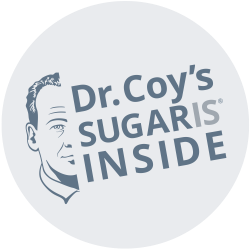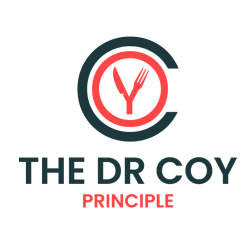A major new study has uncovered distinct metabolic markers linked to lung cancer in non-smokers, challenging the long-held belief that external carcinogens are the primary cause of the disease. Research published in Nature suggests that altered sugar metabolism and mitochondrial dysfunction are key contributors to cancer growth. Such findings reinforce the importance of choosing the right types of sugars and optimising metabolic function to maintain health.
One of the most striking findings of the Nature study is the discovery of abnormal glycogen accumulation in lung adenocarcinoma (LUAD) cells. Glycogen, typically a storage form of glucose used for energy, was found to be elevated in cancerous lung tissues compared to healthy cells. Researchers observed that increased glycogen levels correlated with higher tumour grades and poorer survival rates. Furthermore, experiments showed that enhancing glycogen storage—either through genetic modifications or dietary interventions—accelerated tumour progression. Conversely, inhibiting glycogen synthase, the enzyme responsible for glycogen production, significantly reduced tumour growth, highlighting a potential new target for therapeutic intervention.
These findings reinforce the idea that metabolic reprogramming plays a central role in cancer development. While the Warburg effect—where cancer cells rely on fermentative metabolism rather than oxidative phosphorylation—has been widely studied, this research adds another dimension by demonstrating how glycogen accumulation may serve as an additional metabolic adaptation that fuels tumour progression.
The TKTL1 Gene: A Key to Understanding Cancer Metabolism
Dr. Johannes Coy identified the TKTL1 (Transketolase-like 1) gene, which plays a central role in tumour metabolism by enabling cancer cells to shift from aerobic combustion (efficient energy production) to fermentative sugar metabolism—even in the presence of oxygen. This process, known as the Warburg Effect, allows cancer cells to ferment glucose into lactate even when oxygen is available, avoid apoptosis (cell death) by bypassing mitochondrial energy production, and grow aggressively due to an abundance of energy and metabolic intermediates. By influencing sugar metabolism, the TKTL1 gene drives cancer progression, making it crucial to control glucose availability and support mitochondrial function.
The Dr. Coy Principle: A Comprehensive Strategy for Metabolic Health
To counteract the harmful effects of fermentative sugar metabolism, Dr. Coy developed a five-pillar nutritional approach that focuses on supporting mitochondrial energy production while minimising sugar-driven metabolic stress.
1. Carbohydrate Management with Dr. Coy’s Sugars
Not all sugars affect metabolism in the same way. Dr. Coy’s Sugars provide metabolic-friendly alternatives that support mitochondrial function and some of them limit fermentative processes. These low-glycaemic sugars—such as galactose, tagatose, and mannose along with this intelligent method of carbohydrate management prevents cancer cells from utilizing the fermentation pathway to repair, metastasize and suppress the immune system. Plus, healthy cells and brain cells are still able to obtain energy by the burning of fats and partially by the protein building blocks (ketogenic amino acids).
The Traffic Light Food System further guides individuals towards whole, natural foods while minimising carbohydrates.
2. 2g of DHA & EPA and 10g of MCT Fats Daily
A diet rich in omega-3 fatty acids (DHA & EPA) and medium-chain triglycerides (MCTs) shifts metabolism towards combustion rather than fermentation. These fats support mitochondrial function, and provide an alternative energy source that bypasses glucose metabolism, preventing cancer cells from thriving in a sugar-rich environment.
3. Sufficient Quantities of Secondary Plant Compounds, Especially Polyphenols
Studies show that secondary phytochemicals have cancer-inhibiting properties. The most valuable polyphenols, found in berries, vegetables, and teas, are especially beneficial. For example, glucosinolates are found in broccoli. Secondary phytochemicals improve mitochondrial function and stabilise energy production through combustion, a pathway cancer cells avoid. Polyphenols like quercetin inhibit fermentation and promote fat burning. These compounds are included in Dr Coy’s Keto Drink to provide sufficient amounts on therapy days and are abundant in vegetables on the Green-Light Food List.
4. 100mg of Tocotrienols (Bioactive Vitamin E Forms)
100mg daily, specifically the bioactive forms of vitamin E. Tocotrienols are special, unsaturated forms of Vitamin E found naturally in plants and fruits, particularly palm fruit. Research shows that tocotrienols inhibit HIF1a (hypoxia-inducible factor), a key factor in fermentation metabolism. HIF1a plays a significant role in cancer cells’ resistance to chemo and radiotherapy.
5. 1.5g of Lactate Daily
While excessive lactate accumulation supports cancer progression, controlled lactate intake can support healthy cells by serving as an alternative fuel for mitochondria, stabilising cellular metabolism, and optimising energy efficiency. This strategic use of lactate enhances mitochondrial performance while restricting cancer cells’ ability to hijack energy metabolism.
The Link Between Metabolism, Sugar, and Disease Prevention
The recent discoveries about metabolic markers in lung cancer reinforce the importance of nutritional strategies that favour mitochondrial combustion over fermentation. By following The Dr. Coy Principle, we can prevent blood sugar spikes that fuel fermentative metabolism in cancer cells, promote mitochondrial energy production over fermentation, reduce oxidative stress and inflammation, minimise sugar availability for cancer cells, and support overall metabolic balance and long-term health.
Conclusion
Emerging research confirms that lung cancer in non-smokers is influenced by metabolic imbalances, not just external carcinogens. This underscores the need for a proactive approach to nutrition that supports mitochondrial health and discourages fermentation-driven disease progression. By implementing Dr. Coy’s five-pillar strategy—including the right sugars, essential fatty acids, plant compounds, tocotrienols, and lactate—we can create a metabolic environment that supports health and resilience against disease. The future of cancer prevention and metabolic health lies not just in avoiding toxins but in actively optimising our energy metabolism.
References:
- Nature: Study on Metabolic Pathways in Disease Development
- Intelligent Sugar: Cancer Nutrition with The Dr. Coy Principle


